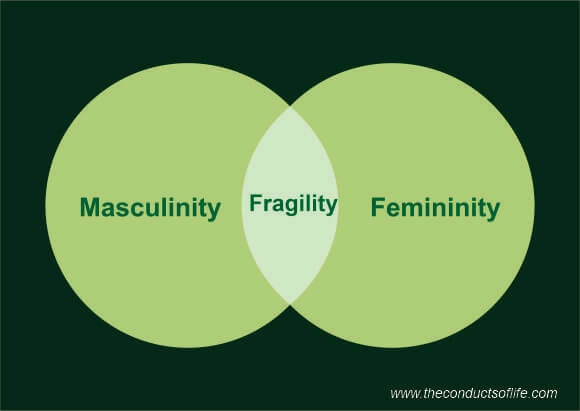Last updated on May 30th, 2024 at 11:48 am
Understand the causes, signs, and how to overcome fragile masculinity. Gain insight into this complex issue and discover ways to express healthy masculinity.
At the core of every man lies this gnawing fragility of masculinity born out of the feeling that he is not a real man. The man that society wants.
“By far the worst thing we do to males – by making them feel they have to be hard – is that we leave them with very fragile egos.” –
Chimamanda Ngozi Adichie, award-winning author
This feeling of failure to be seen as a real man makes him have a fragile ego that is easily bruised.
A bruised ego and overblown masculinity are potential dangers because they can fight hard to rescue themselves from the rut.
This is why masculinity is overlooked by this huge shadow of fragility that haunts it every step that it takes, every word that it says, and every relationship that it makes.
Masculinity has been a thing in literature and a widely discussed topic among men.
In this post, I am going to dissect fragile masculinity bordering on its meaning, characteristics, causes, impacts, and how to overcome it.
Related: Big Signs Of Toxic Masculinity
Table of Contents
- Fragile Masculinity Meaning
- Brief History of Fragile Masculinity
- Signs of Fragile Masculinity
- Impacts of Fragile Masculinity
- Causes of Fragile Masculinity
- Fragile Masculinity in Relationships
- Examples of Fragile Masculinity in Popular Culture
- Fragile Masculinity vs Toxic Masculinity
- Overcoming Fragile Masculinity
- Final Thoughts
- Frequently Asked Questions
Fragile Masculinity Meaning
Fragile masculinity also called male insecurity complex is a sociological concept that refers to the anxiety and insecurity some men experience when they feel that their masculinity is being challenged or threatened.
This can occur when traditional gender roles or expectations are not met, or when men perceive that they are not living up to societal standards of what it means to be a “real man.”
The concept of male insecurity is rooted in the belief that masculinity is something that must be constantly proven and defended.
Masculinity is governed by a set of codes that encourage men to take pride in certain behaviours which are tagged manly.
These behaviours are expected to make him powerful and respected in society.
This can lead to a range of negative behaviours and attitudes, such as aggression, dominance, and emotional suppression, as men attempt to assert their masculinity in response to perceived threats.
Suggested: Why Women Prefer Beta Males As Partners
Brief History of Fragile Masculinity
Throughout history, the development of gender roles and expectations has contributed to male insecurity.
From early societies to modern times, men have faced pressure to fulfill specific roles and ideals.
The concept of masculinity has been tied to masculine energy – physical strength, dominance, and success in various contexts.
Failure to meet these expectations often results in ridicule or ostracization. The shift to industrial societies added the burden of being the sole breadwinner.
The rise of feminism challenged traditional gender roles, leading to a reevaluation of masculinity. The term “fragile masculinity” emerged to describe the anxiety and insecurity men face due to societal pressures.
This highlights the importance of redefining gender roles for a more inclusive society.
Related: Beta Male Traits And Characteristics
Signs of Fragile Masculinity

Fragility in men is characterized by a range of behaviours and attitudes that stem from anxiety and insecurity about one’s masculinity.
Some common characteristics of the male insecurity complex include:
Overcompensation: Fragile men may feel the need to overcompensate for perceived shortcomings by engaging in stereotypically masculine behaviors, such as aggression, dominance, or risk-taking.
Emotional Suppression: It can lead to the belief that expressing emotions or vulnerability is a sign of weakness. This may result in emotional suppression and an inability to effectively communicate feelings.
Hyper-competitiveness: Men experiencing fragile manliness may feel threatened by the success or competence of others, leading to hyper-competitiveness and a constant need to prove themselves.
Suggested: Most Frequently Asked Questions On Masculinity
Resistance to Change: It can manifest as resistance to change, particularly when it comes to challenging traditional gender roles or expectations. This may include opposition to gender equality initiatives or reluctance to engage in activities perceived as “feminine.”
Insecurity in Relationships: Male fragility can lead to insecurity in romantic and platonic relationships, as men may feel the need to assert their dominance or control to maintain their sense of masculinity.
Homophobia and Transphobia: Men with this problem may feel threatened by individuals who do not conform to traditional gender roles or expectations, leading to homophobic or transphobic attitudes and behaviors.
Objectification of Women: It can contribute to the objectification of women, as men may seek to assert their masculinity by treating women as conquests or objects of desire.
Fear of emasculation: Men experiencing male insecurity may have an intense fear of being emasculated or perceived as weak, which can lead to a range of negative behaviors and attitudes aimed at maintaining their sense of masculinity.
Also Read: Why Vulnerability is Key for Alpha Males And Masculinity
Impacts of Fragile Masculinity

Male fragility can have a range of negative effects on individuals and society as a whole.
By addressing the root causes of male fragility and promoting healthier expressions of masculinity, we can work towards mitigating these negative effects and fostering a more inclusive, equitable society.
Mental Health Issues: One of the most significant impacts of weak masculinity is its effect on mental health. Men who struggle with fragility may experience anxiety, depression, and low self-esteem as they grapple with the pressure to conform to societal expectations.
Poor Emotional Intelligence: Male fragility often leads to emotional suppression and a reluctance to express vulnerability, which can hinder emotional intelligence and effective communication. This can make it difficult for men to form deep, meaningful connections with others and may contribute to feelings of isolation and loneliness.
Toxic Behaviours: Weak masculinity can lead to toxic behaviours, such as aggression, dominance, and emotional suppression, which can negatively impact relationships and contribute to a hostile environment for both men and women.
Related: The Impact of Masculinity On Society
Violence: Men experiencing weak masculinity may be more prone to engaging in violent behaviours, including domestic violence and sexual assault, as a means of asserting their masculinity and maintaining control.
Substance Abuse: Fragility of masculinity can contribute to substance abuse, as men may turn to drugs or alcohol as a coping mechanism for their anxiety and insecurity about their masculinity.
Hindered Personal Growth: The resistance to change and fear of emasculation associated with weak masculinity can prevent men from exploring new interests, embracing personal growth, and challenging traditional gender roles.
Gender Inequality: Male fragility perpetuates traditional gender roles and expectations, which can contribute to gender inequality. By reinforcing the idea that men must be strong, dominant, and unemotional, weak masculinity limits opportunities for both men and women to express their identities and pursue their goals without fear of judgment or ridicule.
Negative Impact on Relationships: Insecurity and the need for control in relationships can lead to unhealthy dynamics, such as jealousy, possessiveness, and emotional manipulation, which can negatively impact romantic, familial, and platonic relationships.
Related: How to Escape the Nice Guy Syndrome
Causes of Fragile Masculinity

The following factors can contribute to the development of weak masculinity, as men may feel pressured to emulate these unrealistic portrayals.
Societal Expectations and Gender Roles: One of the primary causes of fragility in men is the pressure to conform to societal expectations and traditional gender roles. These expectations can create a sense of anxiety and insecurity in men who feel they are not living up to these standards, leading to weak masculinity.
Media Representations: Media plays a significant role in shaping our perceptions of gender and masculinity. Movies, television shows, and advertisements often perpetuate stereotypes of what it means to be a man, reinforcing the idea that men must be tough, unemotional, and sexually aggressive.
Peer Pressure and Socialization: The social environment in which men grow up can also contribute to weak masculinity. Peer pressure and the desire to fit in can lead men to adopt behaviors and attitudes that align with traditional gender roles, even if they do not necessarily reflect their true selves.
Parental Influence: Parents can play a significant role in shaping their children’s understanding of gender and masculinity. If parents reinforce traditional gender roles and expectations, their sons may internalize these beliefs and develop weak masculinity as a result.
Fragile Masculinity in Relationships

Male insecurity complex in relationships refers to men feeling threatened or insecure when their masculinity is challenged.
This can lead to controlling behaviour, rigid adherence to gender roles, and a fear of vulnerability.
Men may feel pressure to prove their masculinity through stereotypical traits, hindering open communication and adaptability in relationships.
In extreme cases, this fear can lead to toxic behaviors like misogyny and discrimination against those who challenge traditional gender norms.
Addressing the male insecurity complex requires promoting healthy masculinity, encouraging emotional intelligence, and challenging societal expectations of gender roles.
Also Read: Importance of Self-Awareness
How Fragile Masculinity Affects Relationships
Fragility Ruins a Man’s Sex Life: According to a study, women may change their conduct to preserve their partners’ perception of their masculinity. Because of this, the level of sexual satisfaction for women who think their partners are weak about their masculinity will be lower. They are more prone to fake orgasms and experiencing sex-life dissatisfaction.
Fragile Masculinity Makes the Partner Apprehensive: Male insecurity complex won’t just disrupt your sex life; it will also make it difficult for you to be honest with your spouse. This breeds relationship anxiety in her which is not good for a happy and healthy relationship. Men who struggle with their masculinity frequently suppress information about themselves that would improve their relationships, which makes communication very challenging for them.
Related: What Is An Alpha Male?
Examples of Fragile Masculinity in Popular Culture
Insecure masculinity is pervasive in popular culture, and these portrayals can have a significant impact on our perceptions of gender and masculinity.
By recognizing and challenging these examples, we can work towards promoting healthier expressions of masculinity and fostering a more inclusive, equitable society.
Here are the examples of insecure masculinity in popular culture:
Action Movies and the “Tough Guy” Stereotype: Action movies often feature male protagonists who embody the “tough guy” stereotype – strong, aggressive, and emotionally stoic. These characters are frequently portrayed as the ideal version of masculinity, reinforcing the notion that men must be physically powerful and unemotional to be considered “real men.”
Romantic Comedies and the “Player” Archetype: In romantic comedies, the “player” archetype is a common representation of weak masculinity. These characters are often depicted as charming, confident, and sexually aggressive, using their conquests as a means of validating their masculinity.
Also Read: Signs Of Possessiveness In Relationships
Advertising and The Objectification of Women: Advertisements often reinforce insecure masculinity by objectifying women and promoting the idea that men must be sexually aggressive and dominant to be considered masculine. This can be seen in ads featuring scantily clad women as props or prizes for men, such as beer commercials or car ads.
Sports Culture and Hyper-Competitiveness: Sports culture often glorifies hyper-competitiveness and aggression as essential components of masculinity. Athletes who display these traits are celebrated and idolized, while those who do not are often ridiculed or dismissed as weak.
Music and The Glorification of Violence: Music, particularly in genres like rap and hip-hop, can perpetuate weak masculinity through lyrics that glorify violence, aggression, and dominance. These themes can contribute to the normalization of toxic masculinity and the pressure on men to assert their masculinity through violent means.
Also Read: Sigma Male vs Alpha Male: Similarities And Differences
Fragile Masculinity vs Toxic Masculinity

Fragile masculinity and toxic masculinity are two related but distinct concepts. While fragile masculinity, as we have seen in this article refers to the insecurity and anxiety that some men experience when their traditional notions of masculinity are challenged or undermined.
On the other hand, toxic masculinity is the harmful behaviours and attitudes associated with traditional masculinity, such as aggression, dominance, and the suppression of emotions.
It perpetuates harmful stereotypes and can lead to the mistreatment and marginalization of others, including women and non-binary individuals.
While fragile masculinity stems from a fear of not meeting societal expectations, toxic masculinity is about the harmful consequences of adhering rigidly to those expectations.
Here is a tabulated differences of both:
Difference between Fragile Masculinity and Toxic Masculinity
| Fragile Masculinity | Toxic Masculinity |
|---|---|
| Constant anxiety and insecurity | They are misogynists |
| Makes men resentful | Toxic men are bitter people who are not satisfied with their masculinity |
| Avoids conflict | They constantly are flexing muscles and showing off strength |
| Constantly compares itself to others | They are proud |
| Constantly compares itself to others | They undertake risky activities |
| Helps toxic masculinity to perpetrate its toxicity | They almost always have had near-death experiences |
| Lead desperate lives | They are bullies |
| They are always on the wrong side of the law |
Overcoming Fragile Masculinity

Overcoming insecure masculinity is a journey that requires self-reflection, personal growth, and support from others.
By challenging societal expectations, developing emotional intelligence, seeking therapy, and encouraging healthy relationships, we can break free from the chains of fragile masculinity and embrace healthier expressions of masculinity.
Here are ways to tackle fragile masculinity:
Challenging Societal Expectations and Gender Roles: One of the first steps in overcoming weak masculinity is to challenge societal expectations and traditional gender roles. Recognize that these expectations are often unrealistic and limiting, and work towards embracing a more inclusive and diverse understanding of masculinity.
Developing Emotional Intelligence: Emotional intelligence is a crucial component of healthy masculinity. Work on developing your emotional intelligence by practicing empathy, active listening, and effective communication.
Seeking Support and Therapy: If you are struggling with insecure masculinity, seeking support from friends, family, or a mental health professional can be incredibly beneficial.
Engaging in Self-Reflection and Personal Growth: Overcoming the male insecurity complex requires self-reflection and personal growth. Take the time to examine your beliefs, attitudes, and behaviors, and identify areas where you may be perpetuating fragility in masculinity.
Building Healthy Relationships: Encouraging healthy relationships is essential for overcoming fragility in masculinity. Surround yourself with supportive individuals who encourage open communication, emotional vulnerability, and personal growth.
Final Thoughts
Fragile masculinity, influenced by societal expectations and traditional gender roles, perpetuates toxic masculinity and hinders emotional intelligence.
It has wide-ranging consequences on individuals, relationships, and society. To address it, we must challenge societal norms, promote diverse portrayals of masculinity, and encourage open conversations about gender.
Frequently Asked Questions
What is fragile masculinity?
It is a term used to describe a condition in which a man’s self-esteem and confidence are overly dependent on his perceived masculinity. It often results in behaviors that are defensive of and overcompensating for one’s masculinity.
What are some signs of fragile masculinity?
Some signs of a male insecurity complex can include hyper-aggressiveness, emotional distance, reluctance to show vulnerability, fear of being emasculated, and an excessive focus on traditional gender roles.
How does fragile masculinity affect men?
It can have detrimental effects on men’s mental health and well-being. It can lead to anxiety, depression, low self-esteem, and isolation from social networks.
What causes fragile masculinity?
Several factors can contribute to weak masculinity, including cultural and social norms, a lack of emotional intelligence, toxic masculinity in the media and pop culture, and rigid gender roles.
How can we address fragile masculinity?
We can address insecure masculinity by promoting a more inclusive and diverse definition of masculinity, challenging toxic masculinity, encouraging men to express their emotions and seek help when needed, and promoting healthy models of masculinity in the media and society.
REFERENCES
- Feeling Anxious? 7 Coping Skills to Try
- Masculinity in Crisis
- The Dynamism of Masculinity
- Man up: Is testosterone an elixir of youth?
- How to Overcome Feelings of Inadequacy
- How to Reclaim Your Femininity, and Access Your Vulnerability
Pious Clements is the insightful voice behind "The Conducts of Life" blog, where he writes about life ethics, self-development, life mastery, and the dynamics of people and society.
With a profound understanding of human behaviuor and societal dynamics, Pious offers thought-provoking perspectives on ethical living and personal growth.
Through engaging narratives and astute observations, he inspires readers to navigate life's complexities with wisdom and integrity, encouraging a deeper understanding of the human experience and our place within society.

